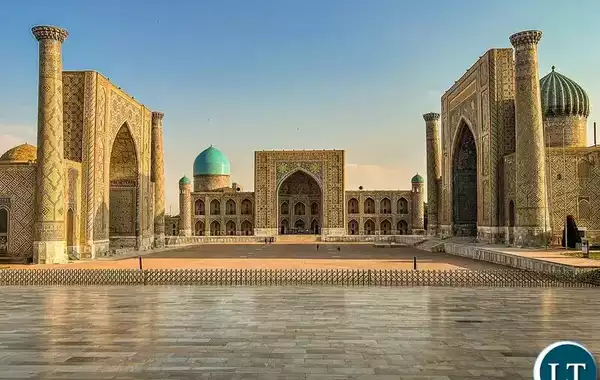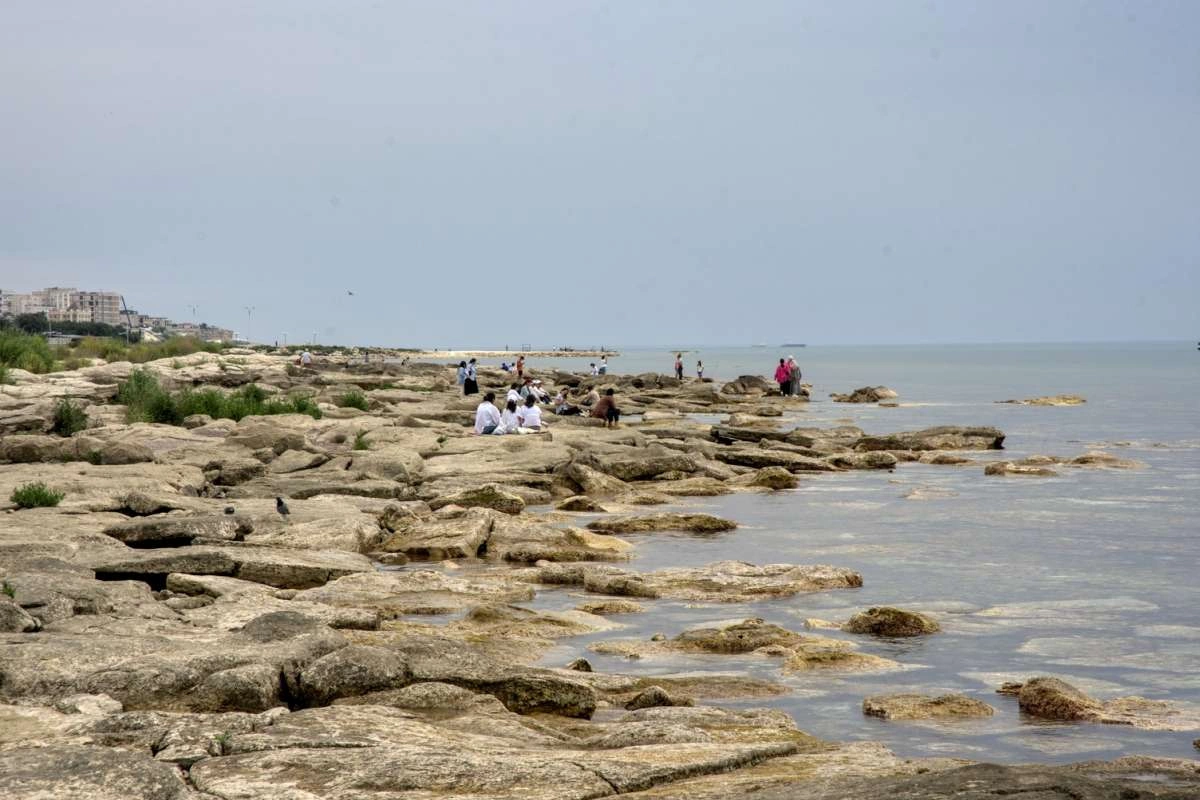
Activists and experts agree that the recession of Aqtau's shoreline will have dire consequences, with energy plants, ports, and trade routes at particular risk.
Image: Adam Loader/Shutterstock
(RFE.RL) AQTAU, Kazakhstan -- Azamat Sarsenbaev, an activist from the Kazakh Caspian Sea city of Aqtau, is trying to bring attention to a problem that is closing in on residents of his city at the same time as their only water source recedes further into the distance.
“Ten years ago we would swim around 200 meters in order to get to these rocks,” Sarsenbaev told RFE/RL’s Kazakh Service, recalling his childhood. “Now we are standing on them.”
There is no doubt that the Caspian Sea -- the world’s largest enclosed body of water that is shared by Azerbaijan, Iran, Kazakhstan, Russia, and Turkmenistan -- is shrinking.
And because Kazakhstan’s section of the Caspian is among the shallowest, it is no surprise that authorities here are scrambling to deal with severe consequences that are no longer far off on the horizon.
Earlier this summer, Aqtau officials announced a state of emergency in relation to the recession of the shoreline -- a measure intended to accelerate mitigation efforts.
Kazakh Environment Minister Zulfiya Suleimenova acknowledged the scale of the problem on the day of the June 8 announcement, citing “climate change as an exogenous factor” and upstream “regulation” of rivers that flow into the lake, such as the Russian-originating Volga and the Ural, as the main causes.
Sarsenbaev is less diplomatic.
Azamat Sarsenbaev, a civil activist from Aqtau in the Mangystau region
While acknowledging that Kazakhstan needs to use water more efficiently, he argues that the construction of multiple dams and other industrial objects along the Russian parts of those two rivers is causing big problems for Kazakhstan.
“They stop the water flow. And if less is coming in from the rivers, the Caspian will keep shrinking,” he said, dismissing the idea popular among many Aqtau residents that the latest plunge is the result of time-honored tectonic shifts under the seabed.
Geological changes have caused sudden shoreline recessions in the past -- including in the late 1970s -- but “a lot has changed in 50 years,” Sarsenbaev argued.
Experts say the Caspian’s most recent shrinking phase began around 2005.
In the last few years, the rate of recession has increased, reaching a visibly critical low.
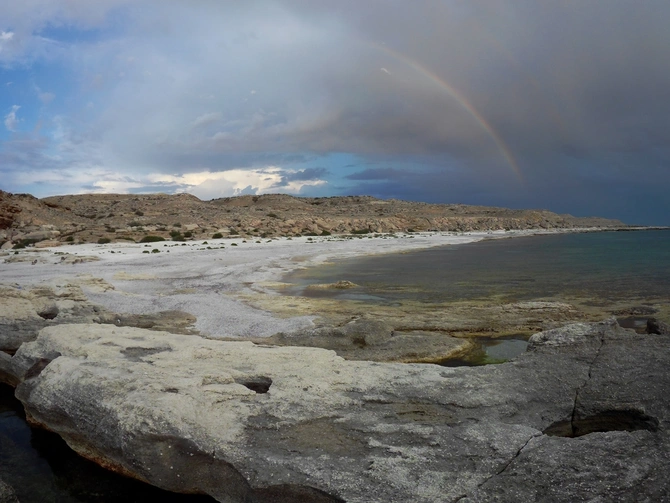
Image: ekipaj/Shutterstock
According to Nature, a British scientific journal, the Caspian Sea’s levels are projected to fall by nine to 18 meters “in medium to high emissions scenarios” before 2100.
The drop is “caused by a substantial increase in lake evaporation that is not balanced by increasing river discharge or precipitation,” the authors of a paper published in 2020 said.
Indeed, current trends suggest that both of those balancing factors may now be in decline.
The need for immediate action is not lost on Murat Igaliev, deputy director of the Mangyshlak Atomic Energy Combine (MAEK), an energy complex that comprises a decommissioned nuclear power plant -- thermal power plants that provide heat and electricity for Aqtau -- and a plant that desalinates water for the town where more than 200,000 people live.
MAEK, in turn, depends on Caspian Sea water drawn from a water intake channel.
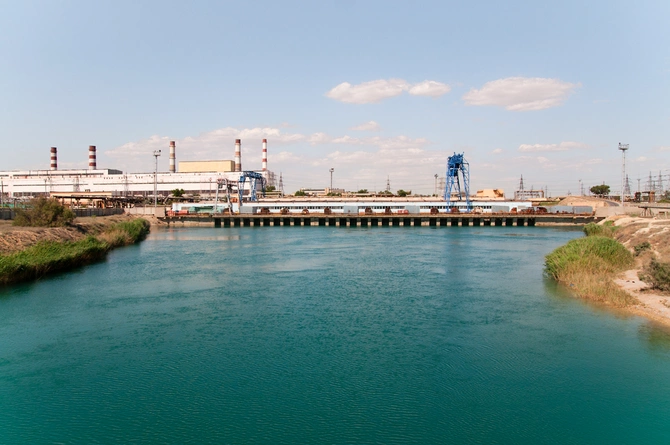
Image: yevgeniy11/Shutterstock
The former Mangystau Nuclear Power Plant (MAEK) in Aqtau desalinates water from the Caspian Sea. Combined heat and power plants use water from the Caspian to cool their reactors and turbines.
In an interview with RFE/RL’s Kazakh Service, Igaliev said that 590 meters of the channel was submerged in 2005, compared to just 145 meters now.
During a harsh winter last year, part of the channel froze, contributing to a drop in power generation, while in the long-run, problems at the aging MAEK threaten the viability of Aqtau as a city.
The urgent reconstruction work required for the channel is part of the reason the authorities declared a state of emergency over the Caspian.
Igaliev said it is vital to find a contractor to begin preparatory work for dredging as quickly as possible and determine “what equipment is better to use so as not to harm the marine ecosystem.”
In addition to the former Soviet “closed town’s” existence, declining water levels in the Caspian put the work of seaports central to the so-called “middle corridor” -- a cross-Caspian trade route that bypasses Russia -- into jeopardy.
Kazakhstan’s traditionally sleepy ports of Aqtau and Quryq have seen demand for their services increase in the wake of the Ukraine war, as some shippers look for alternatives from routes that traverse Russia, which has been hit hard by international sanctions.
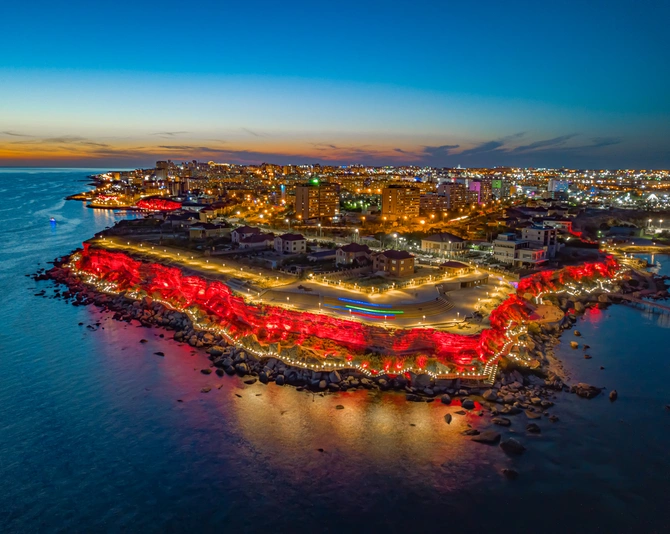
Image: Komarov Igor/Shutterstock
Kazakhstan, in turn, is keen to boost modest oil exports across the Caspian as far as possible in order to ease a near-total dependence on a troubled pipeline that sends Kazakh oil to international markets by way of the Novorossiysk-2 Marine Terminal in Russia.
But the director of the Aqtau port, Abay Turikpenbaev, said the shallow waters near his port had already impacted the work of oil tankers, which can no longer be loaded to capacity.
Turikpenbaev noted that from January 1, 2022 to January 1, 2023, the water levels at the port fell 30 centimeters, significantly more than the average of 5-10 centimeters in recent years.
If that trend continues, dredging work will have to be carried out in order to prevent the port from falling into disuse, Turiqpenbaev told RFE/RL’s Kazakh Service, bemoaning a lack of research into the problem by Kazakh institutions.
For Quryq, some 70 kilometers from Aqtau, the problem is less pressing, given that the port, which was opened in 2017, occupies a position on the shore where the water is deeper.
Nevertheless, Quryq’s port director Serik Akhmetov said the port is already planning for a worst case scenario.
“There are forecasts that the sea will recover. There are also predictions of the opposite. But we cannot sit back and wait. We are currently negotiating with Belgian and Greek dredging companies. We have been dealing with this question for the last six months,” Akhmetov said.
Scientists have few doubts that a drying Caspian will have major impacts -- ecological and socioeconomic -- on its five littoral states and the wider region.
The most obvious evidence for that is the fate of the Aral Sea, once one of the largest inland bodies of water in the world.
The Aral catastrophe, driven by the Soviet Union’s cotton-growing policies in Central Asia, bequeathed a mostly dried up lake that split off into separate Kazakh and Uzbek sections.
And the tragedy still haunts neighbors further afield, as dust storms from the dried parts of the lake travel across borders, lacing farmland in countries like Turkmenistan with salt.
But the degree, timing, and nature of the Caspian impact will vary from littoral state to littoral state, making collective action harder to guarantee.
This is a challenge insofar as the effects are less immediate for Moscow, whose Volga River alone accounts for around 80 percent of the Caspian’s inflow, with the Ural and other Russian rivers playing important secondary roles.
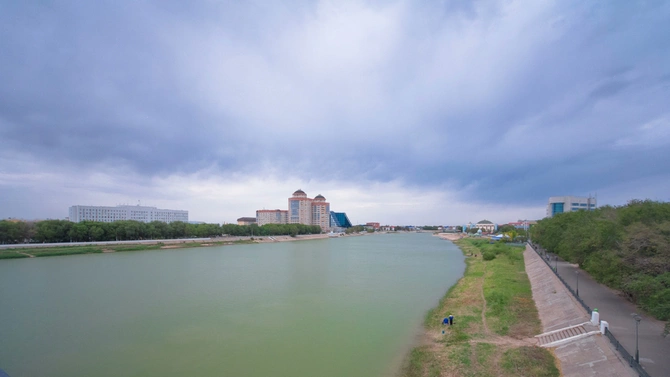
Image: Kirill Neiezhmakov/Shutterstock
During the Soviet Union’s industrialization drive in the 1930s, systematic damming along the Volga was seen as a factor in a sudden drop in the Caspian’s sea levels that was later corrected by a spell of strong precipitation.
And Kazakh experts believe Russia is now intensifying its use of upstream water, hastening the rapid decline of the northeastern Caspian that also hosts Kazakhstan’s economically vital Qashagan oil field.
Former Water Minister Nariman Qypshaqbaev told RFE/RL’s Kazakh Service that he believed state officials who sign and oversee the current transboundary water-sharing agreements with Russia had not done their duty in regards to the Caspian.
“If seven billion cubic meters of [water from] the Ural were still entering the Caspian [each year], then the Ural would not be as shallow [in Kazakhstan] as it is [today],” Qypshaqbaev argued, referencing an agreement that he said was in place during his time as a minister more than two decades ago.
Nowadays, Qypshaqbaev claimed, Russia only guarantees Kazakhstan its agreed share of the Ural’s water for farming and other economic activities, marking the end of the idea that “both sides are responsible for the water going into the Caspian, because the Caspian is common.”
Share on social media
